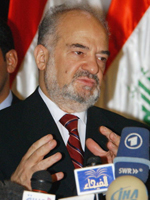Key Iraqi political leaders agree to seek a new prime minister
Key political groups agreed Wednesday to mount a campaign to deny Prime Minister Ibrahim al-Jaafari another term in a bid to jump-start stalled talks on a new national unity government as at least 47 people died in bombings and shootings across the country.

Saddam Hussein, meanwhile, admitted in court that he ordered the trial of 148 Shiites who were eventually executed in the 1980s, but insisted that was no crime. The trial was then adjourned until March 12.
The move against al-Jaafari, which has been building for weeks, is spearheaded by three major political blocs which have been in U.S.-backed talks with the Shiite alliance on forming a new government.
Those talks broke down last week after the Sunni parties pulled out of the negotiations to protest attacks on Sunni mosques in reprisal for the Feb. 22 bombing of a sacred Shiite shrine in Samarra.
During a meeting Wednesday, leaders of three parties, including Sunni, Kurds and the secularists of ex-Prime Minister Ayad Allawi, agreed to ask the Shiite alliance to withdraw al-Jaafari's nomination and put forward another candidate.
Officials of all three groups confirmed the plan but spoke on condition of anonymity because of the sensitivity of the subject.
Under the constitution, the nominee of the biggest bloc in parliament gets the first chance to form a new government. The Shiites won 130 of the 275 seats making them the biggest bloc but not enough to govern without partners.
Al-Jaafari won the nomination by a single vote during an election Feb. 12 among Shiite lawmakers who won seats in the Dec. 15 parliament balloting. He defeated Vice President Adil Abdul-Mahdi in large part due to the support of radical, anti-U.S. cleric Muqtada al-Sadr.
Al-Sadr's militiamen were believed behind many of the attacks against Sunni mosques last week, and the prospect of a prime minister in debt to the young radical has alarmed mainstream politicians, including some in the Shiite alliance.
They fear a strong role for al-Sadr could sharpen sectarian tensions which have already pushed the country to the brink of civil war and complicate U.S. plans to begin drawing down their forces this year, reports AP.
O.Ch.
Subscribe to Pravda.Ru Telegram channel, Facebook, RSS!


